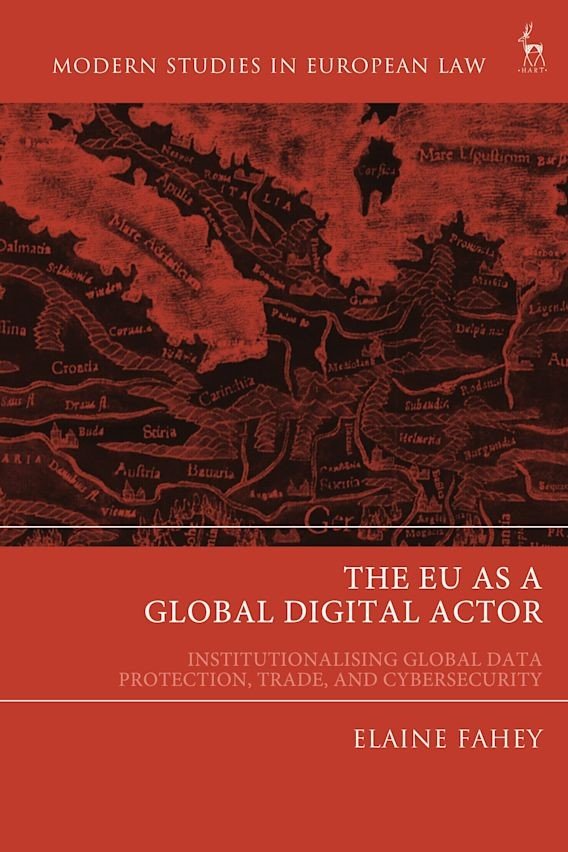Framing the success of the EU as a Global Digital Actor?
Elaine Fahey, Professor of Law at the City Law School, City, University of London.
Institutionalisation - the process of embedding concepts or norms within a governing organisational structure - is arguably the solution to most of the world’s problems but it is rarely scientifically developed. In my book ‘The EU as a Global Digital Actor: Institutionalising Global Data Protection, Trade, and Cybersecurity,’ I studied EU efforts on institutionalisation in data transfer and data governance regimes under EU law, covering from data privacy and data transfers to cyber law and policy. Data is the ‘lifeblood’ of the economies and digital trade across the world, but it is also the source of much concern about privacy rights, the capacity for commercial manipulation of personal information, and State and private actor disputes. Its governance and regulation are increasingly captured by new digital regimes globally, yet its study is highly siloed. Few data privacy scholars focus upon digital trade; few trade lawyers focus upon cyber security and so forth. I argue that institutionalisation can synthesise these many cross-cutting themes and that transatlantic efforts in the area of data privacy constitutes a key case study on this topic.
Internal and external institutionalisation in the EU
The EU embraces the view that international institutions reflect the EU’s interests - as exemplified by Article 21 of the Treaty on the Functioning of the European Union (TFEU). Internally, the EU struggles with partial institutionalisation as a solution to many complex policy fields, such as migration and the eurozone. For example, in the most crisis-ridden domains of the EU, the EU consistently embraces ‘partial’ or embryonic or minimalist-institutionalisation. It is partial or embryonic because it relates to architectural design (legal, political, structural) that is not complete. Yet, institutionalisation has broadly positive and even laudable public interest goals, appearing as an unstoppable EU forte in its internal development.
Externally, the EU has promoted and nudged several institutional multilateral innovations, from the International Criminal Court, to a Multilateral Investment Court in its efforts to promote internationalisation, accountability, legitimacy and the rule of law as a broad global agenda. It has been vocal in proposing large-scale reform of the WTO on the verge of institutional collapse. It has also proposed widespread regulatory cooperation with partners through institutionalisation in its new generation trade agreements.
The institutionalisation of transatlantic relations: the case of data flows
One of the most salient features of transatlantic relations has been its non-institutionalisation. However, within the negotiations of a Transatlantic Trade and Investment Partnership (TTIP), the EU attempted to shift away from the non-institutionalisation of transatlantic relations in order to enhance transparency and ‘governability’ through institutions. In this regard, my research reflects upon the development of transatlantic relations through dialogues and the development of many transatlantic data flow regimes, focussing upon the institutionalisation of data flows, in particular in the Privacy Shield.
The EU-US data flows mechanism was initially weakly institutionalised, with an Ombudsman - belatedly appointed and lacking full independence - along with atypical transatlantic governance. However, judicial decisions on the Privacy Shield have meant that courts have become more central in the governance of data flows and this has resulted, for example, in a Transatlantic Data Review Court proposal to support further judicial action in transatlantic data flows. Moreover, during the last few years, significant convergence may arguably be emerging between EU and US regulators on an approach to Big Tech. Indeed, transatlantic convergence on regulatory standards from competition law to privacy and speech law is emerging. Yet, on both sides of the Atlantic, issues such as divergent agency enforcement of antitrust/ competition and variable regimes on the protection of privacy rights and hate speech are embedded within weak institutionalisation.
The major effort at institutionalisation by the EU with the Biden Administration was the development of a Transatlantic Trade and Technology Council (TTC). It could be argued that, even in its emerging format of structured cooperation and engagement, it is developing a loose institutionalisation of key global challenges currently not well covered or dealt with by, for example, the WTO. Its flexible structure and agency-to-agency contacts seems a useful forum to generate some form of transatlantic convergence - even if its goals are expressly not to cooperate on regulatory policy but instead to address global challenges.
A more traditional form of institutionalisation - but not characteristic of the transatlantic relations - has been agreed recently between the EU and US as part of the Transatlantic Privacy Framework Agreement: a Transatlantic Data Review Court; which is a precondition for the evolution of the TTC. It appears as a very significant deepening of the relationship, but whether it will see the light of day remains to be seen given the complexity involved in its establishment and the array of principles and rules that it needs to satisfy in its operation. Nonetheless, immeasurable benefits for citizens and the public alike in the transatlantic space might arise from this initiative.
Institutionalisation is a key plank in the legitimisation, transparency and accountability of EU international relations. Transatlantic relations, in particular concerning data transfers, show how institutionalisation is evolving in EU external relations, with the potential to change the international landscape of data governance.
The views and opinions expressed in this blog are solely those of the original authors and contributors. These views and opinions do not necessarily represent those of TradeExperettes, the TradeExperettes editorial team and/or any or all contributors to this site.

